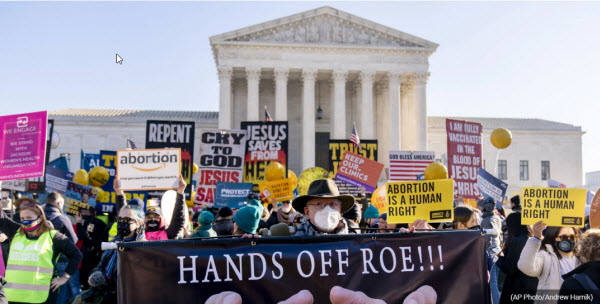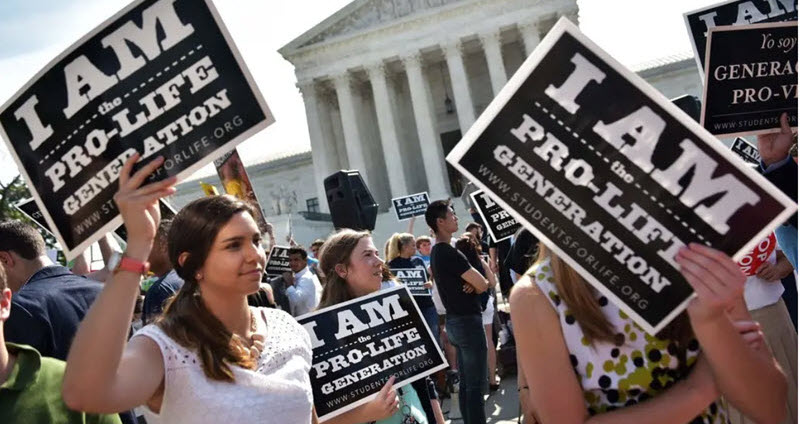Can There Be a Middle Ground to End the Abortion Debate?
May 31 2022The fight over abortion is a war without end because it has always been conducted at extremes. The Alito doctrine resolves none of that because, assuming Roe v. Wade is overturned on his terms, the justice has only moved the issue from one extreme to the other.
For the 50 years since the Supreme Court ruling in 1973, the law of the land has permitted abortion up to the point of "viability", defined as when the fetus can survive on its own outside the womb, set at 23 weeks of pregnancy. This is the left-wing extreme position which says that up to that point it isn't really a human, so it's okay to destroy it. Before that, not quite ready to go forth umbilically untethered, so disposable. It's true that few abortions occur that late, but demanding the absolute freedom of "my body, my choice" for the full 23 weeks without regard to that second life is abhorrent. What if the viability standard were applied to those helplessly intubated with COVID, or to the old in nursing homes who cannot manage unaided. Just let 'em go? The pro-choice absolutists fear they cannot compromise because the pro-lifers never will.
The pro-lifers at the other extreme insist a human is formed at the moment of conception when sperm penetrates egg. Or earlier. Listen to what the fervidly religious Mike Pence said — and in a campaign debate, no less,
"The sanctity of life proceeds out of the belief [in] that ancient principle where God says 'before you were formed in the womb I knew you.'"
You didn't know it but your pregnancy was God's plan. This is where the fanaticism of religion takes over and words such as "sacred" are invoked. It is the moment at which a cluster of cells becomes “ensouled” with no regard to what is actually happening physically in a woman's body. The absolutist pro-lifers cannot be dislodged by knowledge. Unyielding and unquestioning for its coming from religion, their contention that a human is created at the moment of fertilization is a obduracy that admits of no compromise, which guarantees the feud between the two camps has no prospect of resolution.

On the left, so many articles and editorials refer to abortion as "women's health care" as if no other life is involved so as to duck the sordid business. And every time out it is referred to as a woman's "constitutional right". It is nowhere in the Constitution. Is this gaslighting their effort to make us think a Supreme Court ruling makes it constitutional?
The debate is never settled because, as Michael Gazzaniga writes in "The Ethical Brain, "“[m]oral arguments get mixed in with biology, and the result is a stew of passions, beliefs, and stubborn, illogical opinion.” On 
the right, a refusal to accept the science: Peggy Noonan, columnist at The Wall Street Journal, says, "I am pro-life for the most essential reason: That's a baby in there." Hold on. Not for a while after conception. Ross Douthat, the conservative columnist at The New York Times who often writes from a Catholic point of view, says in an article titled "The Case Against Abortion" that
"[W]e now know the embryo is not merely a cell with potential, like a sperm or ovum, or a constituent part of human tissue, like a skin cell. Rather, a distinct human organism comes into existence at conception."
No it does not.
Three weeks into pregnancy, the zygote – one cell each from egg and sperm joined as a single cell – measures 0.1 millimeters, too small to see. After the first month, the embryo's bundle of undifferentiated cells is still smaller than a grain of rice. At the end of the second month, when the embryo begins to be called the fetus, it is only an inch long. By the end of weeks nine through twelve, the fetus has taken on human form, but not right off. Remember, it was only an inch at the outset of week nine. So, weeks nine and ten might still qualify as the fetus being an instruction set for a human but not yet a human.
Women have valid reasons for wanting to end a pregnancy. Apart from the obvious revulsion of having to carry and then care for the product of rape or incest, pregnancy and caring for a child can be economically disastrous for a single woman or a wife whose income is vital. But in the preceding paragraph, we presented a 10-week window during which reasonable persons could agree that abortion does not end what could persuasively be considered a true human being.
But, goes the argument, a woman can go weeks without knowing she is pregnant, tightly narrowing the proposed window, or running past it to find she is too late. Answer: if having sex, test for pregnancy weekly. Pregnancy tests are cheap and reliable. Those on the left need to yield and take some responsibility other than insisting on doing whatever they please for the full 23 weeks.
If the offering could be made that abortion be restricted to the first 10 weeks, it could be a forceful argument against the unreasonableness of the religious fanatics who are entirely free not to abort but have no right dictating their religion or illogic to others.
THE EXTREME ALITO DOCTRINEThat won't change the mind of Samuel Alito, who is on a crusade to make America a theocracy, having ruled on the side of religious plaintiffs in every case. And voting along with him on the right end of the bench — a worry for those who fear related cases will be overturned — are four more Catholics and a fifth who was raised and schooled as a Catholic before becoming Episcopal.
The Alito opinion does not consider the real-world effects of ending Roe v. Wade. His document is interested only in arguing that the 50-year-old precedent is constitutionally invalid, and it took him 98 pages to do so. "Roe was egregiously wrong from the start", he writes with considerable arrogance given that he is faulting five justices in the 7-to-2 Roe decision who were appointed by Republican presidents. Three of the current Court's right-wing majority were appointed by a president who lost the popular vote, two of them by the shadiest of tactics. As a Times opinion piece put it, you'd think that "might counsel a modicum of moderation and humility". Not from Alito, who said, "We cannot allow our decisions to be affected by any extraneous influences such as concern about the public's reaction to our work". He said the same in his confirmation hearing in 2005. We were warned. According to Gallup, 81% of extraneous Americans think abortion should not be outlawed entirely.
Alito's opinion does not ban abortion. It says, "It is time to heed the Constitution and return the issue of abortion to the people's elected representatives". The matter will be returned to the states, which satisfies the conservative desire that the nation be split into 50 different satrapies with the chaos of 50 sets of laws. Abortion will be banned by 26 states that have trigger laws on their books that take effect the moment Roe is overturned.
Lawrence O'Donnell (MSNBC) is dumbfounded by this. We will become...
"a country where your rights depend on where you live. Other countries of the world do not understand this. They do not understand why a fundamental right…depends on your address!"
Roe is hinged on a right to privacy not found in the Constitution, goes the standard objection, but there is an infinity of matters not covered in the Constitution of 214 years ago and the amendments since. Row's right stems from Justice William O. Douglas sensing in 1965's Griswold v. Connecticut "penumbras…emanating" from what the document does say, by which he arrived at the privacy we all should expect. That case was not about abortion, but Roe v. Wade capitalized on the right to privacy Douglas deduced.
Alito had to defeat the privacy issue of Roe. A right not explicit in the Constitution needs to be implicit in the country's history and traditions, is his contention. He was repeating what Chief Justice William Rehnquist wrote about history and tradition in an unrelated case. On those grounds, should not Alito as well advocate reversing women's right to vote like Prohibition? After all, women were considered not at all in the years before 1920 when the Nineteenth Amendment gave them the vote, so that enjoyed neither history nor tradition. And, despite Alito's assurances to the contrary, that criterion has raised concern that Obergefell v. Hodges (2015) could be axed by the conservatives on the Court because same-sex marriage certainly is not rooted in the nation's history or traditions.
After contesting Roe, Alito had to start over in his argument to defeat 1992's Planned Parenthood v. Casey because it made no mention of privacy. Thirty years on, Casey is its own precedent — "precedent on precedent" as Brett Kavanaugh called it in his confirmation hearing. Casey instead keys on "liberty" in the Fourteenth Amendment's "nor shall any State deprive any person of life, liberty, or property, without due process of law". In a long series of cases the Court has recognized in the Fourteenth a number of unenumerated rights that give "constitutional protection to personal decisions relating to marriage, procreation, contraception, family relationships, child rearing, and education" in Casey's own words.
Alito says that for an unenumerated right to be valid under the Fourteenth, it must be "'implicit in the concept of ordered liberty", adding "ordered", whatever that means, to try to encumber "liberty". It comes across as contrivance whereas Casey's point about the liberty statement is powerful:
"[T]he Clause has been understood to contain a substantive component as well, one 'barring certain government actions'…[A]ll fundamental rights comprised within the term liberty are protected by the Federal Constitution from invasion by the States…Our precedents 'have respected the private realm of family life which the state cannot enter.'"
The Constitution specifically proscribes "establishment of religion" which has been its entire history and tradition, but this court will have no problem allowing prayer at public high school football games. We will then see it overturn precedents that allow abortion because there was no history and tradition. Confused?
Please subscribe if you haven't, or post a comment below about this article, or
click here to go to our front page.


1. To consider a woman’s body as not her own is so obviously undemocratic that I’d have to say it is fascist to require her to carry an unwanted fetus to birth. The most that the state could require is that the fetus be removed for the state to look after it.
2. Like almost every journalist – even those solidly in favour a person’s right to their own body, your only criterion for using the marketing term, “pro-life” is that someone be against abortions. Unless someone is opposed to the death penalty and in favour good health care and nutrition and education, please do not refer to them as “pro-life”. Your use of language poses me as “pro-death” or “anti-life”. I appreciate your examining the various views you did in your article, but your use of “pro-life” biases your writing.